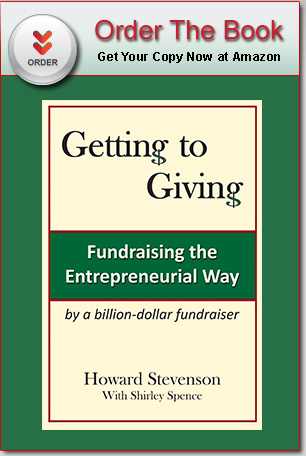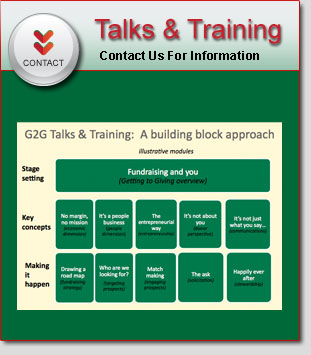Thanks for sending us more great questions! We hope you find our answers helpful.
1. Do you believe that your rate of success reflects your skills as a fundraiser?
I think that a lot of my fundraising success reflects my skills as a listener. I take it upon myself to help others achieve their philanthropic goals. As I probe for them, I try to think about how the activities for which I am raising money fit their goals. Then, I try to help donors understand how they can accomplish their objectives through the organization I represent.
Also, I rarely talk about the organization itself. Instead, I focus on the world, and how we’re working to make a positive impact on something important. This is where many nonprofits go wrong; they talk about themselves and what they need. “Trust us,” is the message. That is very different from inspiring people to partner with you to solve a problem or seize an opportunity.
I ran into this recently, when asked to help an organization with a case statement for an upcoming capital campaign. It was all about them, and what they needed. That comes across as whining: “We’re great. You have to help us.”
My advice: look to the outside. Talk about the tremendous opportunities to make in a difference in the area you serve, and how you are uniquely qualified to do that. Put it in terms that help people understand how they – and their money – can make a difference by supporting you in your work. Then, and only then, talk about the campaign.
The last, and related, thing I’d point to as a success factor is that I try to get the information out to answer the four donor questions we lay out in Getting to Giving: Are you doing important work? Are you well managed? Will my gift make a difference? Will the experience be satisfying to me? And, by the way, that doesn’t end when the check gets handed over.
I recently attended an event celebrating a donors’ second, very generous gift to a health science initiative. It was nice enough, but I could see that the donor was getting tired. As he was chatting with someone, I interrupted to ask if he had ten minutes. Sure, he said.
I took him to a lab and introduced him to four young scientists who showed him what they were working on. He was energized by the exciting work, and touched by their deep appreciation for his contribution to making it possible. It was the highlight of the day, for all of us.
2. Who should make the ask – staff or volunteer solicitor?
The simple answer is: the person most comfortable making it. Sometimes, it’s a tag team effort. The volunteer sets the stage by showing enthusiasm for the project, and then a staff person makes the pitch. Or, an executive director might share her passion and frame the opportunity, and leave the ask to the development professional.
The complexity is: what is an ask? It’s often more of a process than an event, and rarely just one meeting, for a significant gift. We spent two years trying to come up with just the right opportunity for one donor. Another donor made a verbal agreement, but we eventually had to track him down at a beach, and say “We need this signed, please.”



